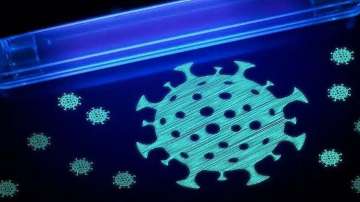Using computer simulations, scientists have shown that the relatively safer far-ultraviolet C (UVC) light can be used to disinfect in-room air, an advance that may pave the way for a new solution to kill aerosolised novel coronavirus in enclosed environments such as hospitals.
According to the research, published in the journal Scientific Reports, low dose of UVC can increase disinfection rates by 50-85 per cent compared to a room's ventilation alone.
The scientists, including those from Cranfield University in the UK, noted that unlike typical UVC -- which has been used to kill microorganisms for decades but is extremely harmful to humans, potentially causing skin cancer -- far-UVC is safe to use around people.
"In indoor environments where it may not be possible to socially distance, aerosolised coronavirus released through breathing increases the chance of spreading the disease," said Liang Yang, a co-author of the study from Cranfield University.
"This research has shown that far-UVC lighting could provide an alternative, safe and inexpensive way to mitigate SARS-CoV-2 transmission," Yang said.
In the study, the scientists found that far-UVC illumination in poorly ventilated spaces can be as effective as N95 masks in preventing transmission.
"With detailed and accurate computational fluid dynamics modelling, we were able to track and eliminate the airborne transmission of pathogens," Yang explained.
"Imagine if you could simply screw a far-UVC light bulb into a standard light fixture. Switching the light on will sterilise the air for everyone in the room.
This is what we're aiming for," Kirk Atkinson, another co-author of the study from Ontario Tech University in Canada, noted.
"While industry and governments are investing heavily in ventilation infrastructure, ventilation by itself has mixed effectiveness if the virus is not being killed. Far-UVC is much cheaper to implement," Atkinson said.
The scientists said the human-safe far-UVC needed for disinfection can be produced by special bulbs and lamps.
They said far-UVC is safe since it has the unique property of interacting more readily, and losing energy more rapidly, than lower wavelength UVC while not being energetic enough to reach living human cells.
